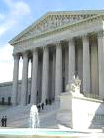|
|
|
Supreme Court to hear capital, labor cases
Law Center |
2007/01/06
|
| The US Supreme Court Friday granted certiorari in seven cases, including a capital case, an endangered species case, and two labor-related cases among others. In the Texas death row case Panetti v. Quarterman (06-6407), the Court will determine whether it is unconstitutional to execute an mentally ill individual who has a delusion about the actual reason he faces execution despite being factually aware of the reason. Scott Louis Panetti knew he was being executed after killing his wife's parents, but he believed that it was actually because he was "preaching the gospel." The endangered species case stems from two consolidated cases, National Association of Home Builders v. Defenders of Wildlife (06-340) and EPA v. Defenders of Wildlife (05-549), and allows the Court to examine whether the Endangered Species Act permits the Environmental Protection Agency (EPA) to transfer permitting authority for the discharge of pollutants to the state of Arizona. In one labor-related case, BCI Coca-Cola Co. of Los Angeles v. EEOC (06-341), the Court will determine whether an employer may be held liable for a subordinate worker's alleged bias where the worker did not make the employment decision at issue. In a second labor-related case, Long Island Care at Home v. Coke (06-593), the Court will decide whether home care workers employed by outside agencies, not directly by families, should receive overtime pay. In other cases, the Court will examine federal law liability for lost or damaged freight, whether private prep schools can talk to prospective student athletes despite their voluntary agreement to obey a no-recruiting rule, and whether courts may consider inferences of innocence when deciding whether someone sued for federal securities violations has a guilty state of mind. |
|
|
|
|
|
|
Class action or a representative action is a form of lawsuit in which a large group of people collectively bring a claim to court and/or in which a class of defendants is being sued. This form of collective lawsuit originated in the United States and is still predominantly a U.S. phenomenon, at least the U.S. variant of it. In the United States federal courts, class actions are governed by Federal Rules of Civil Procedure Rule. Since 1938, many states have adopted rules similar to the FRCP. However, some states like California have civil procedure systems which deviate significantly from the federal rules; the California Codes provide for four separate types of class actions. As a result, there are two separate treatises devoted solely to the complex topic of California class actions. Some states, such as Virginia, do not provide for any class actions, while others, such as New York, limit the types of claims that may be brought as class actions. They can construct your law firm a brand new website and help you redesign your existing law firm site to secure your place in the internet. |
Law Firm Directory
|
|





